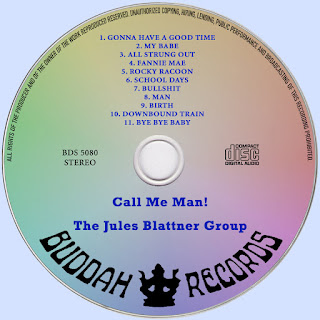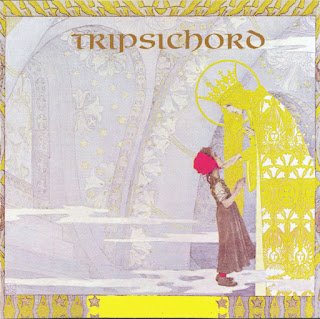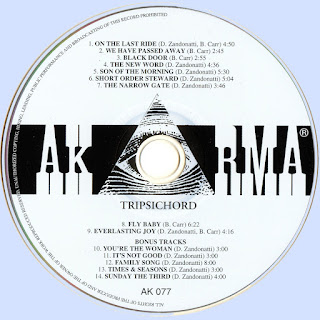Back in the fifties, strange as it may seem, St. Louis was not a major centre for rock 'n' roll. This is despite one of the all time greats, namely Chuck Berry, being based there but seemingly he returned to his hometown to rest as opposed to performing. This left the local St. Louis scene open to various contenders, one of whom was a young and eager Jules Blattner.
He was born on 8th February 1941 as Jules Merrill Blattner and when Rock 'n' Roll music started to sweep across the nation, he soon became interested in artists like Carl Perkins, Gene Vincent, Buddy Holly and Elvis Presley as well as black acts such as Joe Turner and Jimmy Reed. Around 1956, Jules and some of his school chums from Affton High School got together and formed the group Jules Blattner & The Teen Tones. They were all so young that none of them were old enough to drive and so Jules's mum was 'volunteered' to drive them to their various performances. They played at all the local high school dances and Teen Towns, the latter being community dances for the youth. Jules recalls: Rock 'n' Roll music for many was a sound newly heard. Just being in a band made you an outlaw then. Nobody was in a band. There weren´t any where we were from. I guess we were on the cutting edge. We played every Teen Town around. And it was risqué saying "Right Now, the bands going to wee-wee," at intermission time. Woo-woo. If you caught smoking at a Teen Town, you got banned from Teen town for two weeks. You were an outcast. It was a different world. He also advises that he was the first person in St. Louis to have an electric bass.
In early 1959, the outfit came to the attention of Bob Lyons who owned the Bobbin label, a set up basically recording local artists. Bob contracted with the guys and got them into his garage studio where they recorded their own 'Rock & Roll Blues' and 'Gambling Man'. Today, these are cult classics and are much sought after, especially amongst rockabilly collectors. Billboard magazine reviewed the disc and wrote: Blattner has an okay sound on this pounding rhythm side. He has the Presley, Jerry Lee Lewis, Carl Perkins derivative quality throughout whilst Cashbox told their readers: A beat workout that is sure to please any red-blooded rock´n roll teener. Blattner and friends have lots of beat talent. 'Rock & Roll Blues' was a local success reaching the number 8 spot on the charts and position 12 on the rhythm & blues lists. To capitalise on this, in July 1959 Bobbin Records issued their second disc, 'Teen Town' c/w 'Green Stuff'.
There was almost no competition in the region and so they had as much work as they could handle. When a promoter bought a name act to town, the Teen Tones were often engaged as the opening act and also to provide the backing for the artist(s) concerned. That way, they came to work with the likes of Dodie Stevens, Jesse Belvin, Ray Peterson, Isley Brothers, Brenda Lee, Wade Clemmons, Little Richard and, in later years, Ted Nugget and Sha Na Na.
Whilst the two releases on Bobbin had been localised successes, they failed to break out nationally. Accordingly in 1960, Jules decided to try his luck with K-Ark Records, a bigger company based in Nashville, Tennessee. He cut four sides for the label, namely 'Till I'm With You', 'Lonesome', 'Lover Doll' and 'One More Time'. However, upon release, they too failed to achieve the desired national impact.
The band played a lot of fairs in the area: The fair circuit was not only very desirable because of the exposure that you could get there, it was also desirable because of the woman you could get there. Another good place to play and meet girls was the church circuit. The Teen Tones played a ton of Catholic Church dances, enabling them to get in the good with many a catholic mother!!!!. The Teen Tone Fan Club was a cool bunch of wild teenage girls crazy about that big beat sound the Teen Tones put out. These young ladies wore Teen Tones jackets to dances, hoping to be the next steady of Jules.
In the early sixties, St. Louis nightlife was centred on Gaslight Square that contained many of the area's clubs. Jules was included on an album titled 'A Musical Tour Of Gaslight Square' which was issued on Norman Records (#105). This LP featured the house band or top band from different clubs. At that time, Jules was appearing at the Butterscotch Lounge and so he recorded 'Butterscotch Twist' for the set. As the twist was then the in thing, he renamed his band The Twist Tones with that later being amended to The Jules Blattner Group. During the winter season, the guys secured a steady job playing in Hawaii. This 'work vacation' lasted for several years.
The local Norman label was like a home base for Jules as he recorded for them on several occasions through the years up to 1989. The label was named after Norman Weinstrorer, one of the guys who had arranged the record deal between Buddy Holly and Coral Records a few years earlier as he was friendly with Norman Petty and Bob Thiele, the then head of Brunswick Records. Blattner's first record for Norman was 'Slip 'n' Slide' and to publicise this release, the company put out some tasty promotion flyers showing Jules on a waterslide with his guitar. The first release on Norman was followed up with 'Do You Love Me/St.James Infirmary' and then he had two sides out on the Gaslight label. The last mentioned was an attempt to cash in on the twist craze with 'Butterscotch Twist/Liszt Twist'. Two further singles then followed this on Norman in 1962 and 1963.
Jules's first wife had insisted that he added a day job to his schedule and accordingly Jules became a forklift operator but continued to play his music. One day the forklift fell over and Jules knew it was time to quit this occupation. In September 1964 he signed a deal with Coral Records, a subsidiary of giant Decca (later MCA) group. The resulting single had a self written instrumental called 'The Thing' on the flip whilst the A-side was his reading of the Chuck Berry tune 'No Money Down'. Cashbox in their January 1965 review wrote: Jules Blattner unleashes his potent, widerange vocal talents ful blast rockin´ blueser about a guy who trades in his junk for a new set of classy wheels on the easy payment plan. Could be big.
In the mid sixties, Chuck Berry had become a hot act in Europe and the demand for another album built up. To ready one a forthcoming European tour, Berry set up several recording sessions in Chicago. Due to time restrictions and problems with his band, Chuck decided to use Jules Blattner and his band for some of these recordings and accordingly hired them out of the Butterscotch Lounge on Gaslight Square. The band members each made $122.00 for their work but failed to receive any credit on the album cover. It was not easy to work with Chuck Berry as he changed everything at the last minute and did not stick to prepared arrangements. They finally completed the album for Chess Records on 15th December 1964 and the record company titled the album 'In London' (#1495). There was a hit record from the sessions with 'Dear Dad' and, amongst the other tracks, Berry reworked Blattner's 'Butterscotch Twist' as 'Butterscotch'. This did not perturb Jules too much and he continued to record several Chuck Berry tunes.
When his regular base in the Gaslight Square folded in 1965, Jules left St. Louis and finally settled in California. Whilst 1967 was perhaps not the year to record quality rock 'n' roll, Jules nevertheless laid down his versions of Johnny Ace's 'Pledging My Love' and Eddie Cochrans 'Summertime Blues' for the Tee Pee label. Whilst performing at The Forbidden City in Hawaii in 1968, Blattner received an offer from the USO to entertain the American Armed Forces in Viet Nam, Thailand, Singapore, Korea and Japan for a period of six months - three shows a day for seven days a week. The tour commenced just as the Tet Offensive started. He started the tour right when the Tet offensive started. Conditions for the trio and added girl singer were rough and the group were often forced to sleep in bunkers or hotels with shot out windows. Transportation was frequently by helicopters that were hit by enemy fire on several occasions.
Upon his return to the USA, Blattner worked the Wisconsin area as a trio along with Darrell Meister (bass) and Paul Spencer (drums). Upon the break up of this group, he then went out under his own name. Eventually he and another four guys formed a band by the name of Genesis but were forced to change this to Jules Blattner And The Warren Groovy All-Star Band due to the popularity of the UK band of the same name. This outfit then toured around for the next eleven years and initially released singles on the DMA, Cine Vista 5 and Target labels. In mid 1971, he signed a contract with Buddah Records and his first album, 'Call Me Man' was released in 1972. This sold reasonably well and so later in 1972, he recorded the LP 'Back On The Road Again' for Stash Records and hit position 23 on the Milwaukee charts. The following year, the title song was re-released as a single on MGM Records and charted again. As a follow up and remaining with MGM, Blattner recorded his third album titled 'The Mishtabula, Maine Marching Band & Soil Salvation Society' which was released under the name of Seluj Renttalb (Jules Blattner spelt backwards). This was a 'Sergeant Pepper' style release, complete with folk music influences and a talking children choir, for the flower power generation. More albums such as 'Live' (Mountain Records) and 'Back To The Basics' (Desmond label) and singles followed in the ensuing years. However, when disco music became the in thing, it was hard for a rock 'n' roll band to obtain regular bookings and accordingly Jules took up public relations works.
In the early eighties, Blattner returned to St. Louis and, despite his years as a musician, attempted to earn a living selling cars. This career lasted two weeks and came to an end when, whilst he was swimming in the pool of his mother's apartment complex, he heard some young kids playing music. He went down to watch and heard them play 'Louie Louie': I thought wait a minute. There´s bucks here. I can put this back together and not have to learn any new tunes. I take it serious and not make a joke out of the old tunes as many bands do. I´m a good song caller. I can read a crowd and I can get them dancing on song one.
Come 1992, Jules Blattner was voted (by the readers of the Riverfront Times) the Best Local Rock & Roll Artist which clearly demonstrated that he still had many loyal fans in the region. The same year saw him recording and issuing a new album, 'Jump On This', which was a mixture of funky rhythms, chirping horns and clever lyrics. He has composed hundreds of songs, released six albums and around forty singles.
Jules has been married three times and has a son and grandson and is still taking care of his 85-year old mother. He has no desire to retire and still plays about twice a week in the St.Louis area. Every once in a while, he revisits Casa Loma Ballroom that was established founded back in 1927. When he plays there, he fills the place and is regarded as a local hero. This is confirmed the overheard conversation of two guys at one of his shows. One guy said "Who the hell was that?" and the other replied "Oh, that´s Jules Blattner. He´s older than dirt, but he really rocks".
by
Tony WilkinsonTracks
1. Gonna Have A Good Time - 1:02
2. My Babe (Willie Dixon) - 3:58
3. All Strung Out (Rudy Clark) - 2:25
4. Fannie Mae (Waymon Glasco) - 2:26
5. Rocky Racoon (John Lennon, Paul McCartney) - 3:24
6. School Days (Chuck Berry) - 2:40
7. Bullshit - 3:14
8. Man - 4:35
9. Birth - 6:28
10.Downbound Train (Chuck Berry) - 2:39
11.Bye Bye Baby - 0:20
All songs by Jules Blattner except where noted
*Jules Blattner - Vocals, Guitar



























